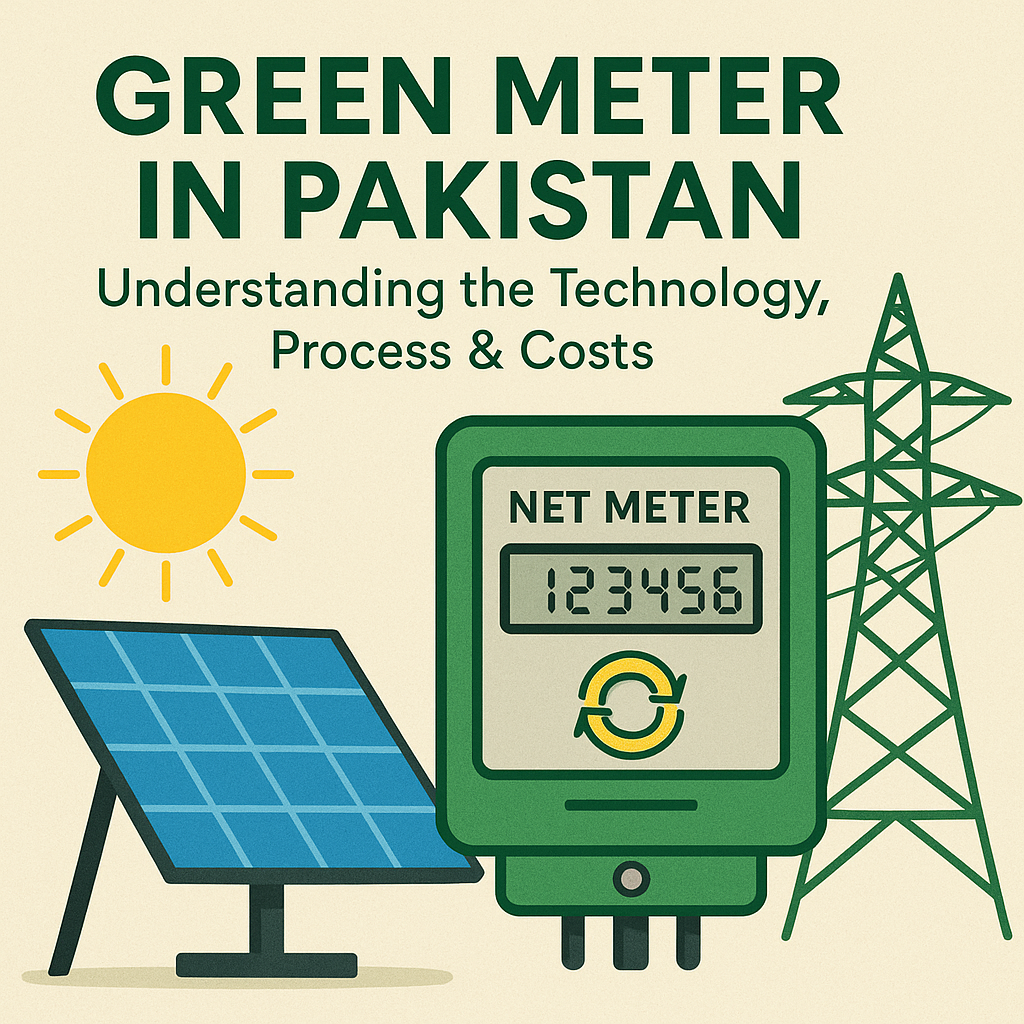Pakistan is steadily moving towards renewable energy solutions, driven by the need to reduce dependence on fossil fuels and lower electricity costs for consumers. Among the innovations making this shift possible is the green meter in Pakistan, also commonly referred to as a net meter.
A green meter is a specialized device that allows consumers with solar power systems to export excess electricity back to the national grid. In return, they receive credits on their electricity bills, making it easier to justify the investment in solar technology. This approach not only benefits consumers financially but also supports the country’s clean energy targets.
What is a Green Meter and How Does It Work?
The concept of a green meter is simple yet impactful. It tracks two primary things:
-
The amount of electricity you draw from the grid.
-
The surplus electricity your solar panels send back to the grid.
When your solar system produces more electricity than your household or business consumes, the extra power is fed into the grid. The green meter records these exported units. At the end of your billing period, the exported units are subtracted from the imported units, and you are billed only for the net amount. In some cases, if you export more than you consume, those extra credits carry over to your next bill.
Why the Green Meter Matters in Pakistan’s Energy Landscape
Pakistan faces multiple energy challenges — rising fuel prices, frequent load-shedding, and heavy reliance on imported fossil fuels. The green meter plays a crucial role in addressing these problems:
-
Reducing Power Shortages – Distributed solar power lessens the strain on the national grid during peak hours.
-
Encouraging Renewable Adoption – Incentivizes individuals and businesses to invest in solar power.
-
Lowering Emissions – Solar-generated electricity fed into the grid reduces reliance on coal and oil.
By making renewable energy financially viable, green meters can help bridge the gap between Pakistan’s energy needs and its sustainability goals.
Benefits of Using a Green Meter in Pakistan
-
Lower Electricity Bills – Exported energy directly reduces your monthly bill, making solar investments more rewarding.
-
Eco-Friendly Choice – Less fossil fuel usage means cleaner air and a smaller carbon footprint.
-
Grid Support – Extra electricity helps stabilize supply, especially in high-demand seasons.
-
Long-Term Savings – Although there is an initial cost for installation, savings over time can be substantial.
-
Energy Independence – Reduces dependence on unpredictable fuel prices and power shortages.
Green Meter Price in Pakistan
One of the most common questions from potential solar users is: What is the green meter price in Pakistan?
Generally, the green meter price in Pakistan ranges between PKR 15,000 and PKR 30,000. The variation depends on factors such as:
-
Type of Meter – Single-phase or three-phase.
-
Region – Different DISCOs (Distribution Companies) may have varying rates and approval fees.
-
Installation Complexity – Some sites require more wiring, safety devices, or adjustments to existing electrical systems.
Additional costs may include:
-
Net Metering Application Fees – Paid to your local DISCO.
-
Inspection Charges – For site visits and technical checks.
-
System Upgrades – In case your solar inverter or wiring needs modification to meet standards.
Step-by-Step Installation and Approval Process
-
Feasibility Assessment – Before applying, ensure your solar system meets the technical requirements of net metering. This includes having an inverter compatible with grid connection.
-
Application to DISCO – Submit a request to your regional electricity distribution company (e.g., LESCO, K-Electric, IESCO).
-
Site Inspection – Engineers visit your property to confirm compliance with technical and safety standards.
-
Approval and Documentation – You may be required to sign agreements outlining your rights, responsibilities, and tariff structure.
-
Meter Installation – The green meter is installed, replacing or supplementing your existing electricity meter.
-
Activation – Once activated, your meter will start tracking imports and exports of electricity.
Role of Companies like Feroze Power
While the approval process is handled by DISCOs, the technical preparation often involves solar energy providers. For example, Feroze Power offers solar setups designed to integrate seamlessly with net metering systems. They ensure that the solar system meets the grid’s technical standards, making the transition smoother for customers. Although the company provides the necessary technical support, the process remains regulated by the government to ensure fair operation across all providers.
Challenges in Green Meter Implementation
Despite its advantages, there are some challenges in adopting green meters in Pakistan:
-
Approval Delays – Paperwork and inspection timelines can extend the process.
-
Upfront Costs – Some consumers hesitate due to the initial investment.
-
Grid Compatibility – In rural areas with weaker grid infrastructure, connection may be more difficult.
Tips for Consumers Considering a Green Meter
-
Choose the Right System Size – Match your solar system size to your average energy consumption to optimize savings.
-
Understand Tariff Policies – Ask your DISCO how exported energy is credited and whether unused credits carry forward.
-
Budget for Extras – Include approval, inspection, and potential upgrade costs in your budget.
-
Work with Certified Installers – Ensure your system complies with national and regional standards to avoid approval issues.
FAQs about Green Meters in Pakistan
Q1: Can I earn money from a green meter in Pakistan?
Not directly. You receive credits on your bill, which lower your electricity costs, but excess credits usually carry over rather than being paid out in cash.
Q2: How long does installation take?
From application to activation, the process can take between 4–12 weeks, depending on your DISCO’s workload.
Q3: Do I need a battery with a green meter?
No, green meters work with grid-tied systems. Batteries are optional and only necessary if you want backup power during outages.
Also Read: Your Guide to St Lucia Airport Transfers with Golden Ticket SLU



